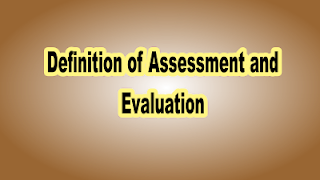Definition of Assessment and Evaluation
Assessment in general can be interpreted as a percentage to get information in any form that can be used for the basis of decision making about students both regarding the curriculum, school climate learning programs, and school policies.
Definition of Assessment
Simple assessment can be interpreted as a process of measurement and non-measurement to obtain student characteristics data with certain rules. And also can be interpreted as an interpretation of the measurement results based on certain criteria or rules.
Assessment is the most important part in learning. Assessment is an advanced stage after measurement. Assessment in general can be interpreted as a process to obtain information in any form that can be used for the basis of decision making about students both regarding the curriculum, school climate learning programs, and school policies.
Simple assessment can be interpreted as a process of measurement and non-measurement to obtain student characteristics data with certain rules. And also can be interpreted as an interpretation of the measurement results based on certain criteria or rules.
According to Djemari Mardapi, there are 2 references that can be used in the assessment process, namely the norm reference and criteria reference. Norm reference refers to the ability of different people but can be described. And the criterion reference assumes that anything can be learned by all people but the mass is different. For this normal reference is used to determine the position of a person in the group. Sedangka criteria are used to determine someone's graduation based on established criteria. With the reference norms and measurement and assessment criteria can be interpreted differently depending on the criteria that have been determined from the beginning.
For example the score obtained is processed, the tiara gets a good score. The vehicle drove 40km / hour the mileage of the vehicle is different if the vehicle is a type of car and motorcycle.
According to Chittenden (Djemari, 2008: 6) in S. Eko Putro Widoyoko (2009) assessment activities in the learning process need to be directed at four things, namely:
- Search, namely activities carried out to trace whether the learning process has proceeded as planned or not. For this purpose educators collect various information throughout the semester or academic year through various forms of measurement to obtain a picture of the achievement of student learning progress.
- Checking, which is to find information on whether there are deficiencies in students in the learning process.
- Search, which is to look for and find the causes of deficiencies that arise during the learning process.
- Conclusion, which is to conclude about the level of learning achievement that has been owned by students.
Definition of Evaluation
Evaluation comes from the English language evaluation which contains the basic word value which means value. In terms of evaluation related to something good or bad.
Evaluation can be interpreted as a process for determining standard criteria in measuring and evaluating and in making decisions based on these criteria. There are various opinions regarding evaluation in learning. According to Suharsimi Arikunto evaluation is an activity of assessing and measuring conducted by the teacher of student work.
Evaluation according to Slavin is a measure of student performance or work academically and non-academically used to determine learning strategies. The evaluation subjects are teachers and students. Regarding the subject of evaluation Slavin also put forward three forms of understanding of evaluation (1) evaluation as feedback, (2) evaluation as intensive, (3) evaluation as information. Evaluation can be used as feedback between teachers and students to determine the abilities of students. The feedback can also produce information about the teaching done by the teacher and its impact on students. After both find out their information will improve in a certain way or trick.
From some of the above understanding it can be concluded that evaluation is a process to determine the value or good or bad learning activities carried out by teachers and students through measurement and assessment.
The evaluation process can also be used as a basis for students in making decisions in choosing roles in the community. Examples of evaluations in learning:
- Formative tests are tests in the short term or tests conducted during the learning process or the end of learning.
- Summative tests are tests conducted at the completion of all study units. Which aims to evaluate students in taking the learning process within a certain time.
